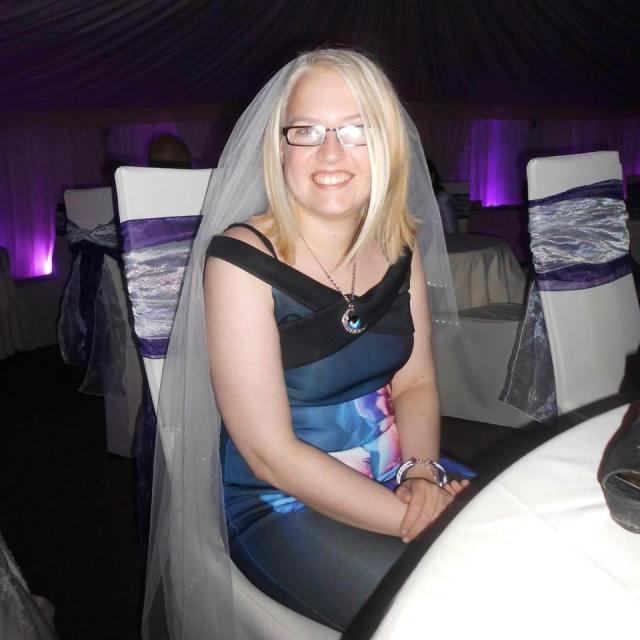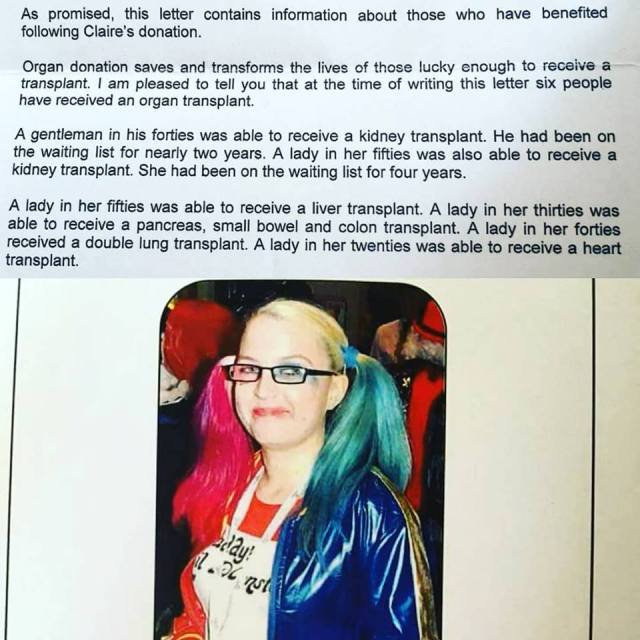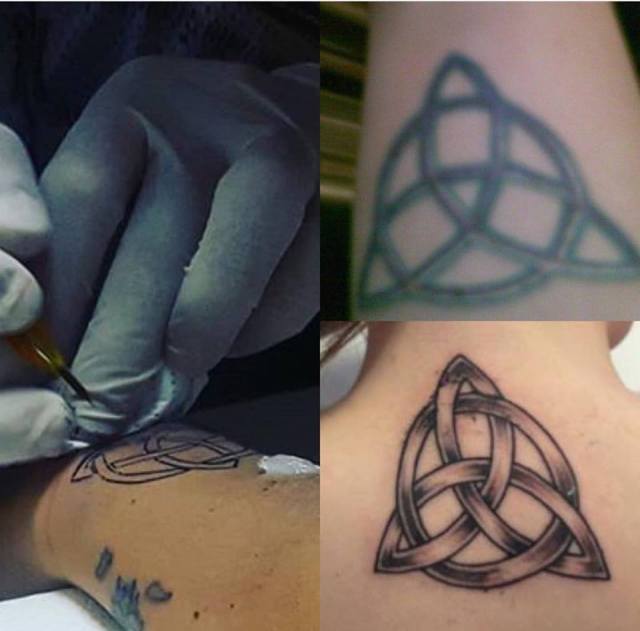
I’d like to tell you a story about my youngest sister, Claire.
My beautiful, mouthy, intelligent, selfless, pain-in-ass, amazing baby sister who died in March this year, aged just 24 – which, apparently according to the endless platitudes and condolences I am still hearing several months on, is no age at all. Whatever that means.
There’s been a lot of talk about the Government’s plans to introduce an opt-out system for organ donation, like the one already implemented in Wales (where my family is from).
You’ve probably read a lot of stories about people waiting on organ donor lists, and how the change to the opt-out system will potentially save an extra 200 lives a year, and all of that is true and good.
I’m not here to tell you you have to donate your organs, as that’s a very personal choice (although, obviously, I would love if it everyone was willing to do this), just how it actually works.
Because I know all too well the situation a person finds themselves in when the question is asked, and so I want to share a little of our story, for context, just so people have an idea of the realities of such a decision – and why it is so, so important to make sure your family know your wishes beforehand.
I don’t like phones at the best of times, but when yours rings at 4:39am on a Thursday, and it’s your family, the news is never good.
Claire collapsed in work, they said. She needs to be rushed to a different hospital with a neuro unit, they said.
I’m walking around my room, half taking in what’s being said, mostly wondering if it would be rude to go and wake up my housemate to let her know that I’m leaving the house and don’t know when I’ll return.
A hastily booked Uber later saw me spending the next two hours on a train from London to Cardiff with nothing for company but my thoughts. I found myself looking for magpies, praying to and bargaining with a God I’ve not prayed to in over twenty years, foolishly googling outcomes based on what very little information I had (NEVER do this, for anything).
I was in contact with my other sister; they had gone home to get some things, and were going to come to the specialist hospital a little later as it was expected Claire would be in surgery for several hours.
When I arrived at the hospital, they told me she was already out of surgery.
In hindsight, that should’ve been a clue.
Then, up to the right ward to wait.
Wait for my family to turn up; wait for the doctors and nurses to give us more information; wait for the news that tore a hole in my chest that will never fully be repaired.
We lost her on the Thursday, but there are very strict protocols and checks hospitals must go through when the cause in brain-related, so the ‘official’ time of death came at 5pm on the Friday.
You’re trying to process this, talk through options, what happens next … and then comes the time where you have to tell people.
I found myself spending the next day and a half looking after my sister’s boyfriend and friends; I needed something to do, and being practical instead of dealing with my own emotions seemed like a sensible choice.
Spoiler: it wasn’t
Having to explain to some, specifically, that this was it – no, there was nothing else they could do, this was their chance to say goodbye; would they like to come; of course I’d meet them outside and bring them up to the room; would they like me to take them in?; yes, I know it looks like she’s sleeping; it’s OK to cry; I know it looks scary so just be warned; they have to keep her breathing for the organ donation; of course it’s OK to hold her hand; the tissues are at the end of the bed; take as long as you need.
I don’t know how I did it, and I certainly don’t know how we all managed to hold it together when my ten-year-old nephew – who has had to deal with the deaths of my father and grandparents already in his short life – came to the hospital to see his beloved aunt for the last time.
And this is the bit where the story is less mine, and more that of my mother and other sister.
You see, they are stronger people than me.
I never went back to the hospital after that final, short, goodbye that Friday night. My brain knew she was gone, my heart knew she was gone, but I knew the longer I stayed in that hospital as the machines kept her organs functioning while the donor recipients were found and put in place around the country, the harder it would be to leave when the time for her to be taken to theatre came.
I’d walked away from that hospital twice already, I didn’t think I could do it a third time.
And walking away from that hospital that last time was the hardest thing I have ever had to do in my life; like wading through increasingly thickening mud, the air getting thinner with every single, leaden step.
But, my mum and sister were there. They stayed until that last moment, almost 24 hours after her time of death was confirmed, where Claire was being wheeled down to theatre.
And at every single step of the way, from the moment my mum immediately responded to the awful news with “she is an organ donor” to that last trip to theatre, the amazing, wonderful staff always made sure to tell us the same thing: “You can still say no.”
A lot of people seem to think the optout system takes away the choice from the family, but it really doesn’t. You can still refuse, even if there’s an optout system, like there is in Wales; even if they are on the donor register, like Claire was.
We, personally, couldn’t say no – we knew Claire’s wishes, so we were always going to abide by them.
And I couldn’t help but think the recipients were in place, they’d already been told – how could you say no, then?
But we could’ve, and people do, and not a single person would’ve judged us for doing so. Apart from Claire, who would somehow create an afterlife to haunt us for eternity if it didn’t already exist.
They must see it all the time, and I have nothing but admiration the love for those who choose to do what must be one of the most difficult jobs in a hospital.

Yes, we really did use a picture of her cosplaying as Harley Quinn for the order of service
Just before the funeral we got a letter; Claire’s organs saved six lives. We read it out during the service; she’d hate the fuss, but there is nothing more indicative of her character than that; selfless ’til the very end.
I don’t know if I’ll ever be ready to talk to those people if they choose to get in touch, but I hope they all live their lives to the fullest – it’s what she would want.
That was four months ago now, and one of the strongest lessons I’ve taken away from the whole process is this: Talk to your family, let them know your wishes – whatever they are.
Because if the time ever comes for them to make the decision – and I hope they never have to – knowing your wishes takes one very, immediate, difficult decision out of their hands at a time when they are going through the unimaginable.
So thank you, baby sister, for making this small aspect of an awful day better for us, and for changing the lives of six other people and their families with a decision you never even gave a second thought.

Sisters forever ❤













 If we shadows have offended,
If we shadows have offended,